A lot of people want to start a blog but don’t want to put their name on it for privacy or safety concerns.
An easy way to address this concern is by blogging anonymously. This allows you to use a pseudonym or alias to protect your privacy.
In this beginner’s guide, we will show you how to easily blog anonymously using WordPress while keeping your personal information safe.
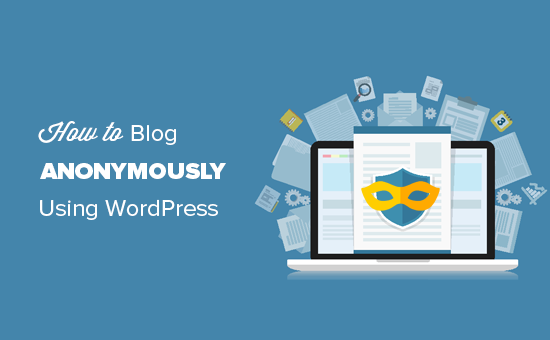
Note: This guide is not for journalists or whistle-blowers doing high-risk work. They should use something like TOR or other similar tools. This is for an average blogger who wants to blog anonymously.
Anonymous Blogging Pros & Cons
Many users simply want to blog anonymously to express their opinions or share their personal stories.
Most want to remain anonymous because they fear it may affect how people see them in their real lives. Some want to do it just to be more creative.
There are pros and cons to blogging anonymously, and it’s crucial that you understand them before you start blogging.
Pros of Anonymous Blogging using WordPress
- Freedom to share personal details or express opinions without being judged
- Protect your personal identity and information
- Keep your online personal life separate from your professional life.
- Easily build authority. For example, you can create a trusted personal finance blog, even if you’re a painter by profession.
- Creative and artistic freedom
Cons of Anonymous Blogging Using WordPress
- Not able to meet with people who follow your blog
- Limited monetization options. You can still use Google AdSense, but you will have to share your personal information with Google
- If someone is determined, then they can still trace your blog back to you.
That being said, let’s see how to blog anonymously using WordPress.
How to Start an Anonymous Blog using WordPress
There are two types of WordPress websites.
First, there is WordPress.com, a hosted blogging service, and then you have WordPress.org, also known as self-hosted WordPress. For comparison, see our guide on the difference between WordPress.com vs. WordPress.org.
There are other blogging platforms as well. However, we recommend using self-hosted WordPress.org to have complete control of the privacy and ownership of your website.
You will need a domain name and a website hosting account to start your self-hosted WordPress blog.
We recommend using Hostinger. They are offering WPBeginner users a free domain with a generous discount on hosting.
Basically, you can get started for $2.24 per month.
Hostinger accepts payments using digital currencies like Bitcoin.
Additionally, they include free Domain Privacy when you sign up, which is important for anonymous blogging. We will talk a bit more about domain privacy later.
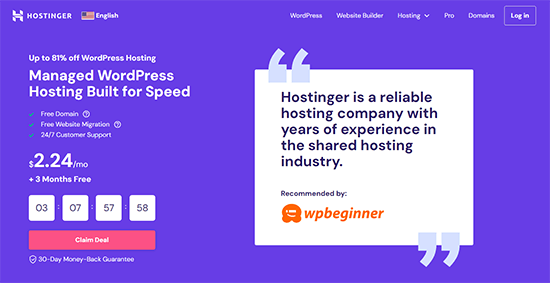
Once you have signed up for the hosting account, the next step is to install WordPress.
Hostinger offers a 1-click WordPress installer to easily set up your blog. You can also follow our WordPress installation tutorial for step-by-step instructions.
After you have installed WordPress, let’s make it anonymous.
Using Domain Whois Privacy
When you purchase a domain name, you must provide contact information, like name, address, phone number, and email address. This information is publicly accessible, and anyone can look it up.
Many domain name providers offer a service called Whois privacy to protect customer privacy. This service displays their contact information instead of yours for a small fee.
If someone sends an email to the address on a WHOIS privacy page, it will be forwarded to you.
You can purchase domain privacy protection during the setup on most hosting companies.
For example, Hostinger automatically includes 1 year of free domain privacy when you purchase your hosting account using our Hostinger Coupon.
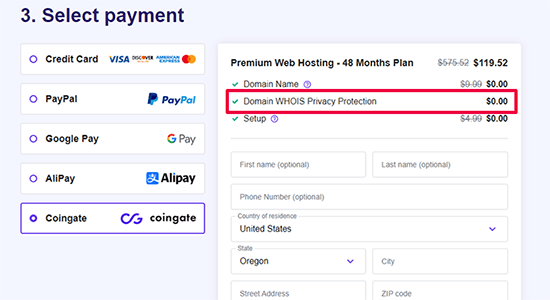
If you didn’t purchase it during setup, then you can always enable it from your hosting account’s dashboard under the domains section.
Using a Blogging Email Address
The next step is to create a new email account to use for your WordPress website and your author profile in WordPress.
You can use a free email service provider like Gmail to create an anonymous email account or use a more private email service like Proton Mail.
After you have created an email account, you need to add it as a WordPress administrative email address. This email address is used to send WordPress notification emails.
You can do this by going to the Settings » General page in the WordPress admin area and adding your new email address there.
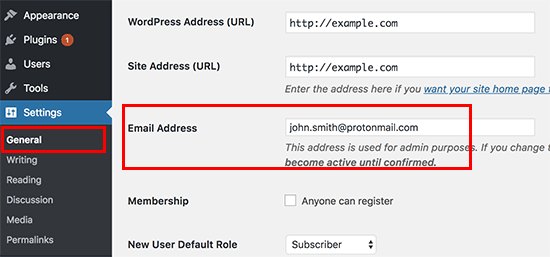
Don’t forget to click on the ‘Save Changes’ button to store your settings.
Next, you need to add the same email address to your author profile page. Simply go to the Users » Your Profile page and add the email address under your contact info.
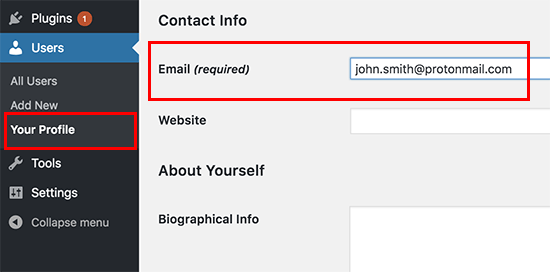
Don’t forget to click on the ‘Update Profile’ button to save your changes.
You can also use Gravatar to display an anonymous profile picture next to your author bio under your blog posts.
Tip: If you are not receiving WordPress emails, then see our guide on how to fix WordPress not sending emails issue.
Using a Pen Name for Anonymous Blogging
You will need to choose and use a pen name, also known as a pseudonym, on your blog. For better WordPress security, you cannot just use admin as your username or author name.
You will need to think of a different fake name that you can use to show your blog content.
To add your pen name, you need to visit the Users » Your Profile page and add the name next to the ‘Nickname’ field.
After entering your nickname, click on the drop-down menu next to ‘Display name publicly as’ option and select your nickname.
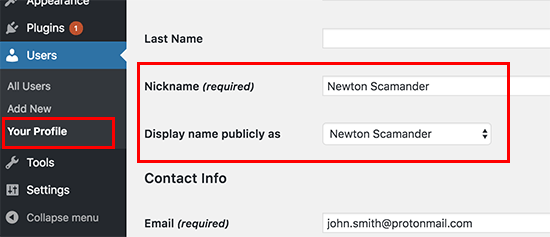
If you want to hide your real identity, you mustn’t add your real first and last name to this user profile.
Don’t forget to click the ‘Update Profile’ button to save your changes.
Using a VPN
VPN (Virtual Private Network) that helps you secure your internet connection and protect your identity.
Normally, all your internet traffic travels through different servers spread across the world. Hackers and governments can spy on this traffic and see what you are doing online.
A VPN acts as a network between your computer and the outside world. All your internet traffic goes to a VPN service, where it is encrypted and sent to the destination using a random server in a different geographic location.
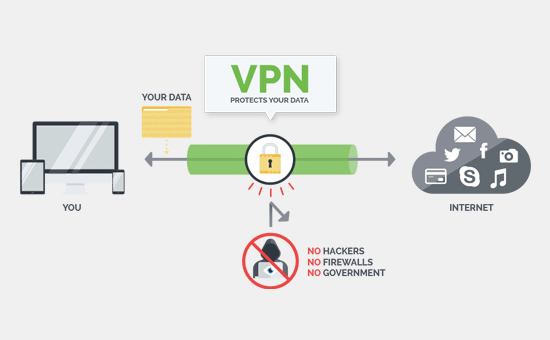
Here is a list of the best VPN service providers to help you find the best solution for your needs.
At WPBeginner, we recommend using IPVanish.
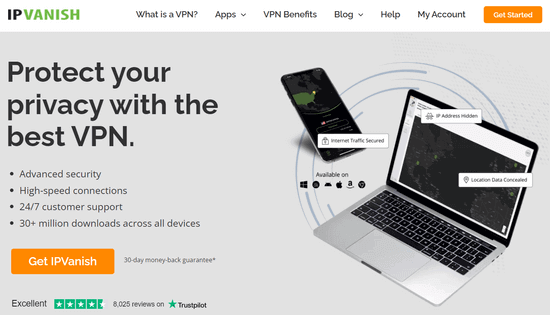
IPVanish offers military-grade encryption and a network of over 40,000 shared IP addresses and thousands of servers.
They also have the easiest software to turn on VPN with the click of a button on any device, including laptops, tablets, and mobile phones.
Building a Successful Blog as an Anonymous Blogger
Even though you want to maintain your online privacy by keeping your blog anonymous, it’s still possible to grow your blog and make money from it.
Here are some tips to make your anonymous blog more successful:
Promote Your Blog on Social Media
You can create anonymous social media accounts to promote your blog and drive more traffic to your site. We also recommend installing social media plugins so that your readers can share your content for you.
Start Guest Blogging
Guest blogging, which is when you write high-quality articles for other websites in exchange for a backlink, is another great way to drive more traffic to your blog.
You can write guest posts under your pen name to keep your identity private.
Monetize Your Anonymous Blog
There are strategies to make money blogging while keeping your identity hidden from the public. For example, you can make money with affiliate marketing by promoting other companies’ products to your audience.
You can also create and sell online courses, eBooks, or other digital products under your pen name using plugins like MemberPress or Easy Digital Downloads.
We hope this article helped you learn how to blog anonymously using WordPress. You may also want to see our ultimate step-by-step WordPress SEO guide for beginners or our expert picks of the best AI chatbots software.
If you liked this article, then please subscribe to our YouTube Channel for WordPress video tutorials. You can also find us on Twitter and Facebook.





Syed Balkhi says
Hey WPBeginner readers,
Did you know you can win exciting prizes by commenting on WPBeginner?
Every month, our top blog commenters will win HUGE rewards, including premium WordPress plugin licenses and cash prizes.
You can get more details about the contest from here.
Start sharing your thoughts below to stand a chance to win!
SW says
Thank you for this helpful post. Can you explain your comment, “If someone is really determined, then they can still trace your blog back to you.” in regards to the cons of Anonymous Blogging Using WordPress. If someone used something like IPVanish wouldn’t that mean they couldn’t trace your blog back to you? Also, if you use a pseudonym, wouldn’t they only trace it back to your fake name?
WPBeginner Support says
There are other methods for tracking back to the owner of a site that the workarounds you mention would not solve. We are not sharing the specifics in this article to prevent abuse.
Admin
Carl says
VPN is a very useful tool for those who want to protect their identity. i do use NordVPN when I am writing my blog. I can not imagine how people are living without a security app like Nord.
WPBeginner Support says
Thanks for sharing the VPN you are using for those looking at their options
Admin
zsquare says
Thanks for this article. for every of the methods above, does it mean one will not be able to monetise the blog except through Google adsense ?
WPBeginner Support says
Unless who you are monetizing your site with states otherwise, you should be able to monetize the site.
Admin
angela murray says
I want to set up an anonymous blog in the united kingdom. Please tell me how i can do this. Thank you
WPBeginner Support says
It would be the same method as in this article.
Admin